|
Movement of Christian Workers
St, Joseph’s, Watford Way,
London, NW4 4TY
Telephone: 0208 2036290,
Fax: 0208 203 62 91
E-mail:
This e-mail address is being protected from spam bots, you need JavaScript enabled to view it
Registered Charity 1023530
The MCW is a member of

|
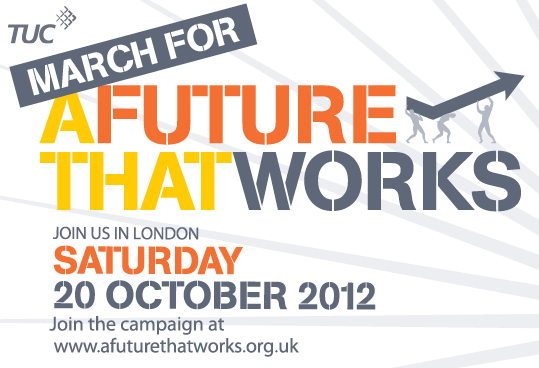
“I
was on the March”. What March? Paul Edwards reports in the Review that
on police estimates, over 100,000, demonstrated against the cuts which
are affecting millions of people. Yet you would be hard pressed to know
about it. Few major English Daily newspapers reported on it. Why would
the peaceful voices of so many be ignored?
Why was it not considered
worthy of publicity? It would be interesting to know your views.
However, the impact and feeling of solidarity for those who were there
will still have been felt. It would have affirmed many that they are not
a lone voice in feeling concerned at the austerity measures taking
place and its affect on the poorest and most vulnerable.
What
is important to draw attention to is that whilst the march could be seen
as against the cuts, as demonstrated by the many banners and placards
its title ‘A Future that Works’ has a positive side to it. Not only
does it imply the need for funding and creating employment it also
‘nods’, albeit cautiously, at possible alternatives, the theme of our
last newsletter. The Union Unite is planning to establish a network of
Credit Unions to challenge the extortionate interest rates of payday
lenders.
Another idea voiced at the march was support for a finance
transaction tax. The idea is to impose a small charge on transactions of
currencies, bonds and shares traded at banks and financial
institutions. The money raised could go against the European countries’
debts. There is however arguments against the idea including the UK who
are apparently particularly opposed to it because of the
implications for the City of London.
Many Christians taking part in the
march would see it as an action in solidarity with those who are and
will suffer the most because of the changes to the Welfare State. It
is imperative that we find a voice, share a voice and have a voice along
with the modern day equivalent of the widow, the orphan, and the
stranger. In practice if we are not with, or for them, then are we
against them? This edition focuses on the actions of MCW members who
have found a place for their voice and a direct expression of their
faith. Our National Conference’s theme in November is ‘The Mission of
the Movement Today’. It would seem that Ann, Marcus & Paul are
living it.
Read our last Review MCW of October 2012
|
|
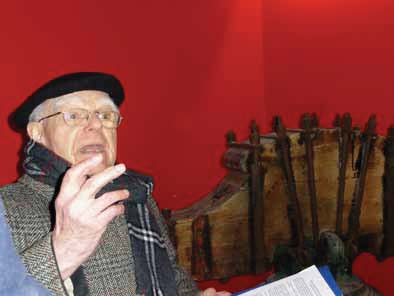 It was with much sadness that I received the news that our friend and our
brother had left us, but that’s normal. Yet, when I think of him and his
life it is also a moment of joy. He was a great man who in spite of his
small stature had a big heart for working men and women, and for all
those who are victims of an unjust society. It was with much sadness that I received the news that our friend and our
brother had left us, but that’s normal. Yet, when I think of him and his
life it is also a moment of joy. He was a great man who in spite of his
small stature had a big heart for working men and women, and for all
those who are victims of an unjust society.
I knew Jean-Marie for more
than 30 years, when as chaplain to the World Movement of Christian
Workers (WMCW) he came to England to help us develop our Movement and
above all how we could improve the review of life. When Jean-Marie
participated in a review of life with English activists, he would always
listen attentively to what was being said and at the end of the sharing
in a very humble way he would give his little reflection about what he
had heard. Despite all the difficulties experienced by the activists
Jean-Marie had the capacity to see the signs of hope, which are present
in all the collective struggles and actions carried out for justice.
Jean-Marie would always say, look here in this situation or in this
action, you can see the resurrected Jesus Christ. He is with you in your
daily struggles. Jesus came into this world and by his life and action
he showed us that the leaders of the Temple of Israel had forgotten what
God wants for the powerless, the poor, the worker, each person who has
been marginalised which is to be set free and liberated from their
oppression. This is what you are engaging in with your friends,
believers and non believers, to build the Kingdom of God here today.
Ten
days ago I had the privilege of eating with Jean-Marie after he had
give an excellent presentation about the history of the working class in
his neighbourhood of Moulin to the members of the International Council
of the WMCW. We
spoke together about our friends and about the economic and political
crisis in France, Great Britain and of course in Europe. As usual he was
very interested in what was happening in the world. What struck me was
that despite his age and weak health, he was involved in some groups of
reflection in the home where he lived with his brother priests on the
documents of Vatican II. He said to me “Paul it is necessary that we as
church rediscover the spirit that came out of this Council”.
Right
up to the end of his life he was faithful to his conviction that we
have to announce the Good News in our daily life and engagements in a
language accessible to everyone. When I look at the Church today and
indeed the modern world that is broken by the current crisis, I am
convinced that the Church and the World needs priests like our dear
brother Jean-Marie.
On
behalf of the Movement of Christian Workers of England I would like to
say that Jean-Marie was, is and will always be with us as a sign of hope
for all who struggle for the realisation of the Good News of Jesus
Christ.
Au revoir my brother, many thanks for all your friendship
and for having shared a part of your life with me and my comrades and I
ask you to pray for us so that we do not abandon the call of Jesus to
construct the Kingdom of God here in our environment today.
Paul Edwards
|
|
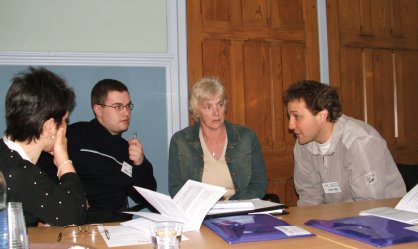 In our world leadership is needed more than
ever. Not just in Parliament or on the TV but in everyday circumstances, in our homes, at work and in the community. In our world leadership is needed more than
ever. Not just in Parliament or on the TV but in everyday circumstances, in our homes, at work and in the community.
The lack of leadership in everyday situations is quite marked. Often people’s opinions are swayed by the media or by those with the loudest voices. And when leadership is evident, it often comes from those who have had opportunities by virtue or their background, schooling and wealth.
Those with more ordinary backgrounds who often lack confidence need to be encouraged, assisted, trained and sustained in being leaders in their lives. This is exactly what the MCW does best.
As someone once said “leaders don’t grow on trees”, they have to be called and formed. This takes resources which means money, equipment, people, experience, skill and expertise.
This issue of our newsletter illustrates the fruits of the work of the Movement in the form of two articles about women activists trained by the Movement and active members of it. Mary is the current Chair of the Movement and is a Cabinet Member of Gateshead Council. Sabah is a member of the Movement in Egypt and has taken an active part in the momentous events which are changing the course of history in her country. Their actions speak volumes and justify the MCW both as a Movement of the Church and in the World.
Without leaders and in particular Christian Worker Leaders who understand the apostolic nature of their role in society, not only is society the poorer but also the Church is deprived of a profound part of its mission to the world.
We have received some interesting comments in response to a recent newsletter about the unique spirituality of our Movement. A number of readers said that the edition reinforced their belief in the on-going value of the Movement whilst another thanked us for reminding him about the value of the Movement’s Review of Life method. We hope to have a similar response to this newsletter.
Enclosed with this edition you will find an appeal letter asking you to support the development of our Movement in different ways, not least to make a further financial commitment. Times are hard and money is tight but it is hoped that this newsletter will inspire you to dig deep to support the work of the Movement.
|
|
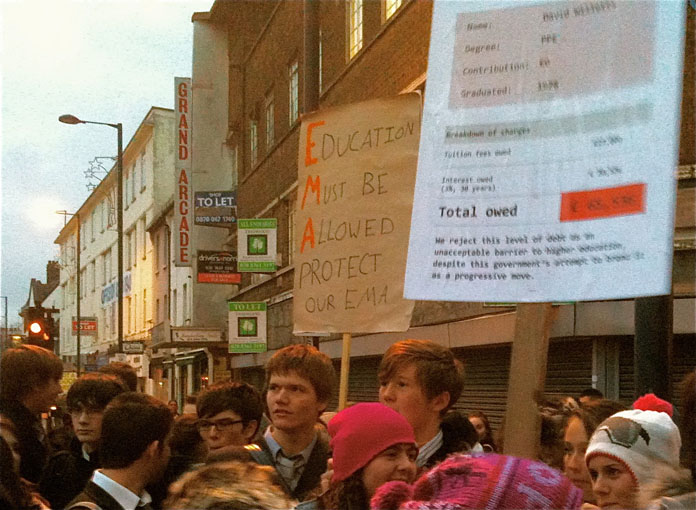 Everyone agrees that we have just come through the hardest winter in many a long year with record temperature levels below minus 20ºC. But are we about to enter even harder economic times? Everyone agrees that we have just come through the hardest winter in many a long year with record temperature levels below minus 20ºC. But are we about to enter even harder economic times?
Recently, Mervyn King the Governor of the Bank of England noted, “that UK wages were stagnant, and coupled with high inflation-this led to the longest decline in the real value of take-home pay in the UK since the 1920s”.
The MCW has previously shown here how UK is a highly unequal society with the gap between the rich and the poor greater than at any time since the end of he Second World War.
|
|
Read more...
|
|
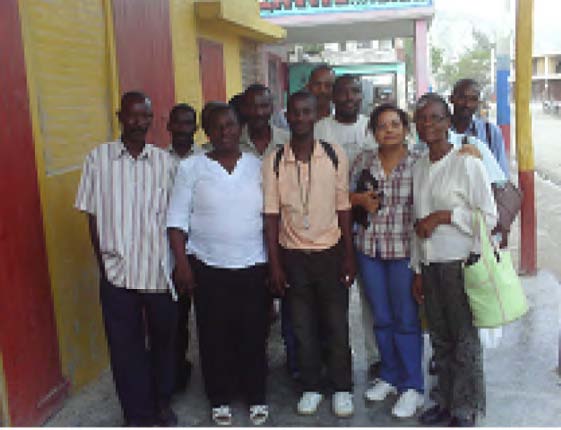
All
the national movements affiliated to the World Movement of Christian
Workers have responded positively, quickly and with enormous generosity
to the call from the International Council to launch a campaign of
solidarity for the support of the Movement in Haiti. Members and
supporters of the English and Welsh MCW have also responded to this call
raising over £1,000. The aim of the solidarity campaign has been to
enable the Movement of Christian Workers (ACO) of Haiti to have the
means to rebuild itself. The money will provide a programme of education
and training for leaders so that the reconstruction of Haiti is in the
hands of Haitians themselves and not foreign leaders no matter how well
meaning their intentions.
In September a small delegation of members of
the movement in the Dominican Republic visited the leaders of the
Haitian movement to make an assessment of the situation and to agree a
plan of action for the reconstruction of the movement. Before Christmas a
training session based on the review of life method will be held in the
Dominican Republic for the current and new leaders of the Haitian ACO.
It is thanks to the international solidarity campaign that this will be
possible. The intention is to collaborate with the YCW in the Dominican
Republic and Haiti in the education, formation and training of leaders.
This will enable them to live their faith through a concrete engagement
in the political and community groups that will need to take
responsibility for the reconstruction of Haiti.
|
 At
a time of very significant public sector spending cuts it is
interesting to note that research undertaken by the Institute for Fiscal
Studies (IFS) shows that these cuts are falling more heavily on those
with low incomes than other groups. The IFS is Britain's leading
independent institute on public finances and tax and has no party
political affiliation. Further details can be found at
http://www.ifs.org.uk At
a time of very significant public sector spending cuts it is
interesting to note that research undertaken by the Institute for Fiscal
Studies (IFS) shows that these cuts are falling more heavily on those
with low incomes than other groups. The IFS is Britain's leading
independent institute on public finances and tax and has no party
political affiliation. Further details can be found at
http://www.ifs.org.uk
Another
recent report entitled ‘Keeping the Plates Spinning'
(http://consumerfocus.org.uk) on payday lending illustrates that those
with few or no alternatives always pay more interest than those with
greater means. Payday lending comprises of a small loan (£100 - £1,000)
advanced until the next payday (usually a month). Charges are fixed at a
fee per £100 and loans can generally be extended each month by paying
this fee or can be repaid in full. According to Consumer Focus, which
commissioned the report, the number of people using payday loans has
quadrupled in the last four years to 1.2 million with £1 billion lent in
2009 alone by around seven major companies. It noted average annual
percentage rates of 2,500%.
|
|
Read more...
|
|
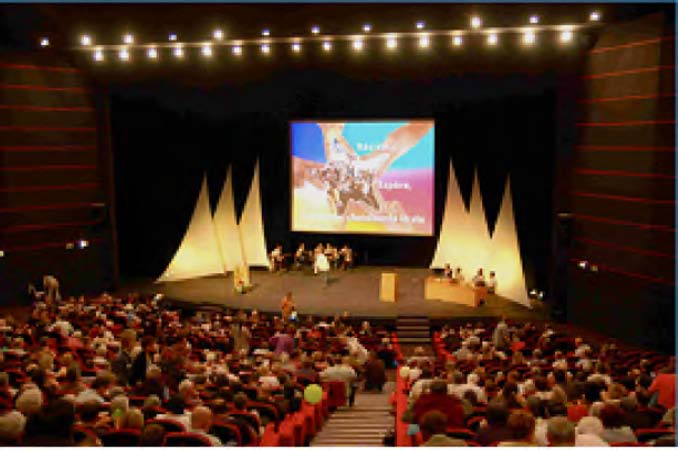 During
three sunny days in Poitiers over the Pentecost weekend (22-24 May
2010) 750 delegates representing 15,000 members of the Action Catholique
Ouvrière (ACO) of France exchanged their experiences of life.
Confronted by their faith in the liberating message of Christ's gospel
they committed themselves to continue to ‘Resist' the attacks on the
poorest and most vulnerable members of French society in order to give
hope to the world. During
three sunny days in Poitiers over the Pentecost weekend (22-24 May
2010) 750 delegates representing 15,000 members of the Action Catholique
Ouvrière (ACO) of France exchanged their experiences of life.
Confronted by their faith in the liberating message of Christ's gospel
they committed themselves to continue to ‘Resist' the attacks on the
poorest and most vulnerable members of French society in order to give
hope to the world.
‘In
a world where money is the king, where anything can be bought and sold,
we have to listen to the cry of men and women, to the silence
of the machines created by factory closures, to the voice of working
people who are losing their jobs, to the migrant workers who are being
ejected from our country. When we hear and listen to these cries, are
they not the cries of love from Christ for the whole of humanity that is
manifesting itself.'
|
|
Read more...
|
|
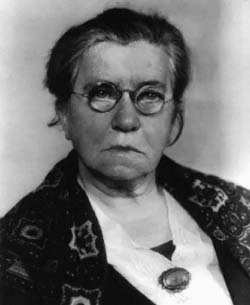 Emma Goldman (1869-1940) a Lithuanian born American
international anarchist is often credited with coining the above title phrase
which Ken Livingston years later used for his book "If voting changed anything
they'd abolish it" (1988). Emma Goldman (1869-1940) a Lithuanian born American
international anarchist is often credited with coining the above title phrase
which Ken Livingston years later used for his book "If voting changed anything
they'd abolish it" (1988).
This sentiment reflects a left wing critique
of liberal parliamentary democratic systems. It argues that such systems do not
bring about any real structural change in the distribution of income and wealth
and as a consequence political power and influence continues to rest with an
economic and political elite.
Recent global events would appear to give
some credence to such a critique. The current economic system puts profits for
a small elite before the collective need of the whole community especially the
most disadvantaged members. In a report entitled ‘Unequal Britain'1 Professor Peter Hills
shows in stark terms the outcome of the obsession with the free market; ‘Britain's
richest 10% are now 100 times better off than the poorest'.
|
|
Read more...
|
| |
|
Who's Online
Make a donation to support our work
|
|
|
|

